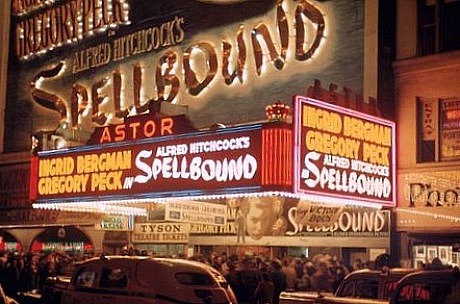Hey, Guillermo — this 1991 Alka Seltzer commercial has been sitting on YouTube since last May 3rd. What’s the history of it? How did you get the job? How many takes? Did you shoot any others? I’m kind of wondering why nobody passed it around or posted it before Anne Thompson put it up a few hours ago.
Month: January 2011
It's Over
It feels so great that the holiday is only a few hours from being over and that regular life will begin again tomorrow morning. Well, within a couple of days. It’ll take that long for people to get their engines going again (it always does), but the great shutdown of 2010 is no more.
Period Piece
In an interview with Collider‘s Steve Weintraub, The Social Network/The Girl With The Dragon Tattoo director David Fincher has said that the latter film, due in December 2011, will be strictly set in the year and the technological realm of 2003, or “pre-iPhone.” That’s because author Stieg Larsson was “probably thinking” of a 2003 world when he wrote the “Girl” books, Fincher says.
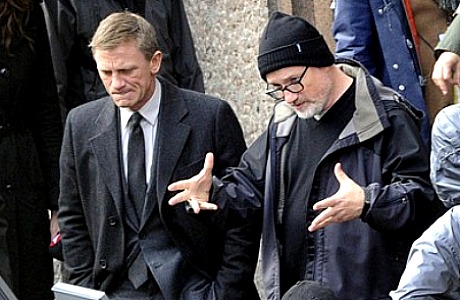
The Girl With The Dragon Tattoo star Daniel Craig, director David Fincher during filming in Sweden.
“What year does [the story] take place in?,” Fincher says. “Well, Larson’s books are delivered in 2004, so he’s probably thinking in terms of 2003, it’s not published until 2005, 2007 is the iPhone, so all those apps that would be available to the iPhone are probably something that Lisbeth Salander would have access to ’cause she’s a bit of a Mac junkie. So you kind of go, ‘Well where do we draw the line?’ So we just said, look everything has to be pre-iPhone technology, because otherwise they would be sitting there going ‘Well, we just go over here.’ They would have a compass; they would be able to tell what the weather was like.
“So there’s all that stuff, you just have to make a decision [that’s] fairly arbitrary, basically everything in the movie is pre-iPhone.”
Once again, Fincher is sharing his basic Holy Grail faith in the Larsson books. They’re sacrosanct and part of history and can’t be changed in the slightest detail — they have to happen in Sweden despite the rank absurdity of all the characters speaking in English, and the story has to happen within the exact same culture that was influencing Larsson when he was writing the books. I respect Fincher’s aesthetic integrity, but going strictly period just feels weird to me. Think of all the changes that have to be enforced in terms of cars and flatscreens and God-knows-whatever-else. How could the story be affected that heavily by the use of Google Maps and having a good idea what the weather will be like a couple of days hence?

The Girl With The Dragon Tattoo costars Daniel Craig, Rooney Mara. Wait –have Mara’s eyebrows been shaved?
Suggestion/Offer
Wells to Manhattan-based, Sundance-bound publicists: I don’t have to tell you that the next two weeks offer excellent opportunities to pre-screen whatever films you have playing at Sundance 2011. Producers usually don’t want their films seen on this basis, I realize, but the facts are that (a) Sundance journalists are always trying to get into the same 25 or 30 buzz films and (b) most of the others always seem to be scrambling for attention, some more than others. For 65% of the allegedly hot films up there it’s “move it or lose it.”
I for one would love to be able to see as many Sundance ’11 films in advance as possible, and I’m sure other columnists feel the same way.
Those producers of Sundance or Slamdance films unwilling to screen in advance could at least consider sending along embed codes of trailers or short-peek reels. I’d be happy to run whatever I’m sent between now and the start of the festival, or over the next two and a half weeks.
Araki World
Gregg Araki‘s films (including his latest) are never about finding employment or learning a craft or driving a cab or creating art or taking care of a child or nursing a sick dog. They’re always about attractive young urbans with cool haircuts and slim, well-toned bodies doing lots and lots of boning — straight, gay, polymorphously whathaveyou.
In other words, things haven’t changed that much since The Doom Generation (’95). Indeed, Kaboom (which will play at Sundance later this month) “picks up where Araki’s ‘Teenage Apocalypse Trilogy’ of the 1990s left off,” says the Sundance summary.
For what it’s worth, Kaboom is about “an ambisexual 18-year-old college freshman” — an Araki constant — “who stumbles upon a monstrous conspiracy in a seemingly idyllic Southern California seaside town.” The Sundance notes call it “unrestrained and completely over the top [with] scatological and absurd Valley-inflected dialogue, elements of campy gore and Araki’s troupe of arrestingly sexy guys and girls.”
Blue Turns to Gray
I’m trying to cobble together an “abandonment theory” about movie-watching. It’s basically about a syndrome in which you enjoy and admire the hell out of a film when it first comes out but then you start to go cold on it once the “wrong” people (i.e., unwashed megaplex hordes) start embracing it big-time. This hasn’t happened with any regularity, and in fact has occured hardly at all. But it has happened once in a blue moon.
The most recent incident didn’t concern a film but a piece of music — Peter Tchaikovsky‘s “Piano Concerto No. 1.” Black Swan inspired me to buy a few Tchaikovsky tracks on iTunes a couple of months ago, and that was fine. But on 12.26 I read Frank Rich‘s N.Y. Times piece about “Disneyland Dream,” a short film about a 1956 trip to Disneyland made by middle-class family man Robbin Barstow. This led me to watch “Disneyland Dream,” which to my shock and regret begins with “Piano Concerto No. 1.”
I know this makes me sound like an aesthetic reactionary, but the Barstow association killed my Tchaikovsky feelings. Suddenly the revered Russian wasn’t a Darren Aronofsky-endorsed composer but a favorite of some middle-class Connecticut dad who could have been the father of Dennis the Menace, and the instant I heard Tchaikovsky’s French horns at the beginning of Barstow’s film, I bailed. I said to myself, “Okay, that’s it…I can’t be on the same boat as Barstow…Tchaikovsky may drift back into my head down the road but right now he’s over….sorry.”
A kind of reverse abandonment situation has happened with True Grit. I didn’t emotionally care for the Coen Brothers film when I first saw it in a screening room, but I might have eased up if it had failed commercially. I might have watched it again and decided (who knows?) that it’s slightly more affecting or whatever. But now that it’s become a huge hit I can’t possibly watch it again with a more open attitude. Now I’m really against it. I can’t open myself up to a chilly western that the wrong people (i.e., ticket buyers) have made into a success and a possible awards contender. Game over. I was right the first time and that’s that.
I loved E.T., the Extra-Terrestrial when I saw it at an early screenings in ’82, and came to despise it once it become a megahit. But I didn’t abandon Titanic when it became the biggest hits of all time. The last 20 to 25 minutes of that film are so affecting that I’m still on-board with it. What others? Not many, I’m sure. My usual tendency is to hang tough when I like something, come hell or high water.
Streep's Coming Blitzkreig
In yesterday’s “Ladykillers” piece I bypassed Meryl Streep/Julia Roberts as potential Best Actress contenders in John Wells‘ film version of August: Osage County. That’s due to the strong likelihood of this Harvey Weinstein/Jean Doumanian co-production being a 2012 release. But what would happen if the Osage County team got the lead out and opened their film 11 months hence?
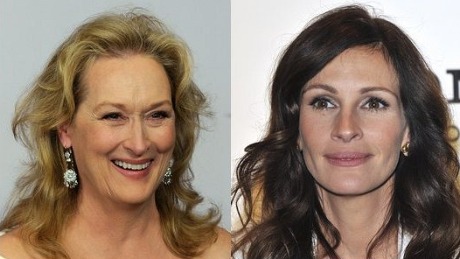
Meryl Streep vs. Julia Roberts in August: Osage County could become one of the greatest within-the-same-film female acting battles of all time.
I’ll tell you what happens: Streep wins the 2011 Best Actress Oscar in a walk. But the more likely finale is that she wins a year later, or when they hand out the 2012 Oscars in February 2013.
Osage County will reportedly begin filming next summer (presumably between May and August), or a month or two after Streep finishes portraying conservative British prime minister Margaret Thatcher in Phyllida Lloyd‘s The Iron Lady.
An extremely rushed post-production schedule would be required for August: Osage County to be released by next December, and urgency has never been an issue in preparing the screen version of Tracy Letts‘ Pulitzer Prize and Tony Award-winning play to begin with. If anything, the watchword has been “drag-ass” — the original Steppenwolf production opened three and half years ago and the film adaptation was decided upon in ’08. Letts, I’m told, has taken his sweet time writing the screenplay version, presumably due to pressures to translate his 210-minute play down to a more butt-friendly 150 or 160 minutes.
One further assumes that Streep wouldn’t want to be competing against herself with two Best Actress performances — Margaret Thatcher (which you know she’ll kill with, even if the film isn’t absolutely top-grade) vs. Violet Weston. And I can’t imagine that the producers of Iron Lady and August: Osage County would want an awards-season showdown.
But perhaps Meryl wouldn’t mind. If both films were to open this year there would be almost no choice but to hand her a second Best Actress Oscar (the first won in ’84 for Sophie’s Choice) and her third overall. The double-barrelled blitzkreig would be all but unstoppable.

(l. to r.) Amy Morton, Rondi Reed and Deanna Dunagan in the original B’way production of Tracy Letts’ August: Osage County.
The more likely scenario is that Streep gets nominated for The Iron Lady but doesn’t win, but returns with guns blazing in August: Osage County. Given the snail’s pace so far, I’m expecting to see Wells’ film open sometime between September and December of 2012. If you know Violet Weston you know Streep will be nominated, trust me. And so will Roberts, I’m guessing, due to her having one hell of an angry, intestinal-fortitude, emotional-river role as Streep’s daughter, Barbara Fordham. But Streep wins, in part due to a 2011 overlap sentiment with voters thinking “well, she was so great as Thatcher and now she’s excellent again,” etc.
So Streep either picks up her Oscar in February 2012 (if both films open this year) or, more likely, February 2013. But one way or the other, she’s in. The perennial “Meryl again?” whine won’t make a dent.
The only possibly troublesome issue facing The Iron Lady and August: Osage County is whether their directors are up to snuff. Never forget that Lloyd, a theatre and opera director, made Mamma Mia! into a hugely successful but agonizingly awful film to sit through. And the fact is that Wells did such a fine job of conveying unemployment angst in Company Men that he made me feel like I was stuck in a minimum-security prison.
Iron Lady costar Jim Broadbent told Vulture‘s Kyle Buchanan in a 12.29.10 posting that the film will start shooting in London at the end of this month.
A further concern (or suspicion, if you will) about The Iron Lady is a decision by Lloyd and producer Damian Jones (The History Boys) to have female screenwriter Abi Morgan rewrite Brian Fillis’s screenplay, which dates back to ’07. I haven’t the first clue about the quality of anyone’s screenplay or writing, but hiring a screenwriter who’s described herself as an example of “Thatcher youth” suggests that Lloyd and Jones are looking to soften or at least emotionalize the portrayal.
Morgan (who also wrote the screenplay for Steve McQueen‘s forthcoming Shame) told a Scottish interviewer earlier this year that “I need to be in charge and that comes from when I was growing up and money was always an issue…I didn’t want to feel the fear of poverty again and I suppose in that way I qualify as Thatcher Youth.”
Ladykillers
If you want to be freewheeling and scattershot about it, here’s a list of potentially award-worthy actress performances in 2011 films, pruned down somewhat from a list sent in by HE reader danbmcg. It’s actually not all that scattershot. I’ll eat my recently purchased Urban Outfitters winter jacket if a good 60% or 70% of these performances don’t at least get talked up as Oscar-worthy.
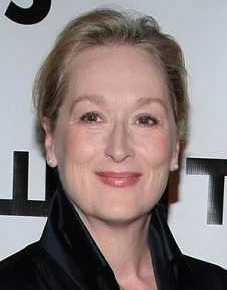

(l.) Meryl Streep, (r.) Margaret Thatcher.
Meryl Streep, The Iron Lady. Already one of the most anticipated female performances in 2011 with Streep portraying British Prime Minister Margaret Thatcher during the Falklands War. A likely default choice for Best Actress consideration even before filming has begun. The film, costarring Jim Broadbent as Denis Thatcher and directed by Mamma Mia‘s Phyllida Lloyd (whoops!), is apparently destined for release later this year.
Juliette Binoche, Sponsoring. Lesbian love affair drama. Directed by Malgorzata Szumowska.
Glenn Close, Albert Nobbs. Cross-dressing Irish period piece. Directed by Rodrigo Garcia.
Vera Farmiga, Higher Ground. Struggle-with-faith drama directed by Farmiga, heading for Sundance, costarring John Hawkes, Bill Irwin.
Zoe Kravitz, Yelling At The Sky. Director: Victoria Mahoney. Urban survival drama
Helen Mirren, The Door. A female writer and her maid. Duerctor: Istvan Szabo. Costarring Martina Gedeck.
Michelle Monaghan, Machine Gun Preacher. Director: Marc Forster. The story of Sam Childers (Gerard Butler), a born-again ex-drug-dealing and biker and his wife Lynn (Monaghan), etc.
Carey Mulligan, Shame. Director: Steve McQueen. Mulligan as Michael Fassbender’s sister, dysfunctional family drama, 30-something hound, “his myriad sexual escapades, and what happens when his wayward younger sister moves in,” etc.
Ellen Page, Freeheld. Director: Catherine Hardwicke. Female car mechanic, terminal illness, pension benefits.
Charlize Theron, Young Adult. Director: Jason Reitman.
Naomi Watts, The Impossible. Director: Juan Antonio Bayona. Watts playing the wife of Ewan McGregor in 2004 tsunami disaster drama.
Rachel Weisz, The Whistleblower. Director: Larysa Kondracki. Nebraska cop, post-war Bosnia, sex scandal coverup.
Michelle Williams, My Week With Marilyn. Director: Simon Curtis. Monroe vs. Olivier (Kenneth Branagh) during shooting of The Prince and the Showgirl. Williams also has Meeks Cutoff, which is playing Sundance ’11.
Reese Witherspoon, Pharm Girl. Directors: Glenn Ficarra, John Requa. Big Pharma whistleblower/moral reckoning drama.
Acceptance
Vulture‘s Kyle Buchanan: “There has been a lot of chatter about whether you should be competing for the Best Actress Oscar or Best Supporting Actress. Was that decision yours?”
Another Year‘s Lesley Manville: “It wasn’t, really. Sony has now quite categorically put me in the Best Actress category. That might be an error — I don’t know — but it’s their call. I’m a novice at this, so I wouldn’t dictate it, really. I don’t know. It seems to have been a good year for women.”
Buchanan: “And thus, it’s a very crowded category.”
Manville: “I sort of try to think beyond that, that at last, it’s a good year for actresses. You know? And a lot of those actresses are over 40. It’s not just about young people — there are films being made that deal with women getting older. That’s a huge bonus, and here in America, that’s a huge step forward. But I’m kind of here and I’m doing [the awards circuit], and I can’t make the outcome be anything other than what it will be. I’m quite philosophical — I wasn’t born yesterday, and I’ve been acting for over 30 years. I’ve got a reality check on it.” — from a 12.31 Vulture interview.
Slim Pickens
Movie-wise, the first three months of any year are always rough-going. The second and third month, actually, because January, bad as it is commercially, is always covered by the Sundance Film Festival. And yet last February and March each offered a film that ended up on some 2010 ten-best lists: Roman Polanski‘s The Ghost Writer on 2.19 and Noah Baumbach‘s Greenberg nearly 30 days later.
Not this year apparently, to go by appearances and guesstimates. Which January, February or March openings will at least get me through the bad patch? A few seem intriguing, but ingredient- or expectation-wise I’m not seeing anything that’s remotely Ghost Writer or Greenberg-level. If somebody knows something I don’t, please advise.
The best January release (1.21) I’ve seen so far — certainly the one with the strongest performance — is Martin Pieter Zandvliet‘s Applause (1.21). It’s a straight character-driven drama that feeds off the magnetic Danish actress Paprika Steen, who plays a divorced stage actress with anger, alcohol and general-incompatibility-with-the-world issues. It opens during Sundance but Steen has been gathering admirers since Applause began screening two months ago.
There’s also Sang-soo Im‘s The Housemaid (1.21), which I saw and half-liked eight months ago in Cannes. “A sexual hothouse melodrama made in the spirit of Claude Chabrol and Brian DePalma,” I wrote. “Dark perversity within a well-to-do family…I wasn’t entirely floored but was done with it for the most part.”
Peter Weir‘s The Way Back opens the same day, but you can take your time. “I knew going in that anyone making a journey of 4000 or 5000 kilometers on foot will face terrible strain and hunger and hardship,” I wrote on 11.24. “What, then, did The Way Back tell me? It told me that making a journey of 4000 or 5000 kilometers on foot involves terrible strain and hunger and hardship.
Nor was I taken with John Wells‘ Company Men, which opens the same day. A drama of layoffs and despondency affecting three Boston-area white-collar guys (Ben Affleck, Tommy Lee Jones, Chris Cooper), it “plays like an intelligent funeral in a nicely furnished minimum-security prison,” I wrote during Sundance ’10.
There’s also Richard J. Lewis‘s Barney’ s Version (1.14), which I panned on 12.6. “[It’s] so steeped in the lives and culture of Montreal Jewry that I was having trouble breathing,” I wrote. “Barney’s Version isn’t just about boomer-aged Canadian Jews who grew up and lived in Montreal, but will probably only play with boomer-aged Canadian Jews who grew up and lived in Montreal.”
There’s a chance that Gregg Araki‘s Kaboom and Hans Petter Moland‘s A Somewhat Gentle Man (which I’m watching on disc tonight) could pan out so let’s not say anything.
I haven’t seen Ron Howard‘s The Dilemma, Ivan Reitman‘s No Strings Attached (rumored to be a possible Norbit-in-the-ointment film that could diminish Natalie Portman‘s Oscar chances), Season of the Witch (i.e., the latest Nicolas Cage IRS-debt film) or The Green Hornet (forget it).
It’s too early to discuss February or March with any authority. But the only February release that looks even half engaging right now is Miguel Arteta‘s Cedar Rapids (Fox Searchlight, 2.11 — a Sundance ’11 premiere). And only three March releases stand out for me — Jonathan Liebesman‘s Battle: Los Angeles (Sony, 3.11), Jonathan Hensleigh‘s Kill The Irishman (Anchor Bay, 3.11) and Carey Fukunaga‘s Jane Eyre (Focus Features, 3.11).
"How You Know You're Awake"
I finally caught up with Martin Scorsese‘s Public Speaking. Fran Lebowitz‘s luterary output has been sparse sparse over the last couple of decades, but she knows. “Simply making people laugh is the lowest form of humor”? This is the other kind.
All That Glittered
Last March I posted shots of old-time Times Square marquees (“Big Ass Marquees,” “More Marquees“) from the ’50s and ’60s. Here are some new discoveries. The color pic of the Astor’s display for Alfred Hitchcock‘s Spellbound is an eye-popper. If only the others had this kind of luminosity. You can almost see Michael Corleone and his girlfriend Kay trying to nudge their way through the main doors.
“Along with the almost-complete disappearance of palace-sized movie theatres with balconies over the last 30 years is the abandonment of super-sized, building-mounted promotional art,” I wrote last year. “We still have the huge billboard posters along L.A.’s Sunset Strip and along 42nd Street between Eighth Avenue and Times Square, but it’s a shame that today’s moviegoers will never know the visceral thrill of standing before flamboyantly large movie promotions attached to big marquees (or building walls above marquees) that were common in Times Square until the mid ’60s. They had a real Collossus of Rhodes-type aura, these displays. What’s life without a little grandeur?”
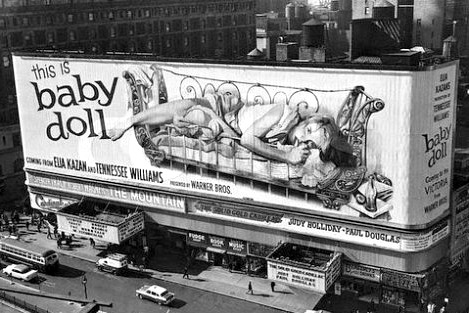
At some point during Martin Scorsese and Kent Jones’ Letter to Elia, it’s said that Baby Doll director Elia Kazan persuaded Warner Bros. to mount this huge, erotically provocative billboard of Carroll Baker.
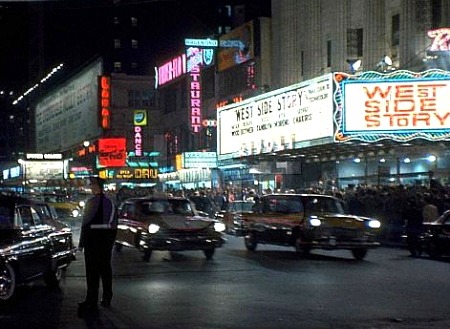
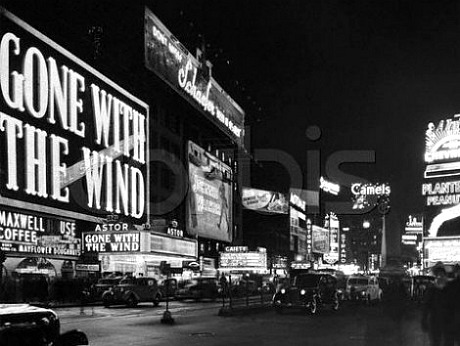
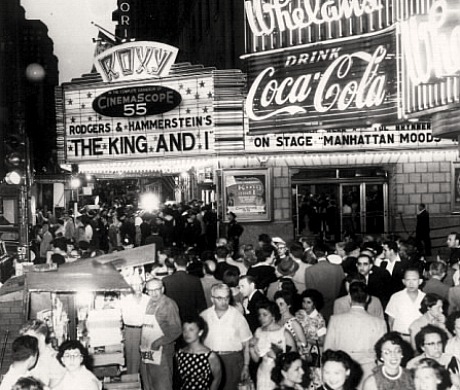
The 5,920-seat Roxy theatre, located at the northeast corner 50th Street and 7th Avenue, opened on 3.11.27 and was torn down in 1960.
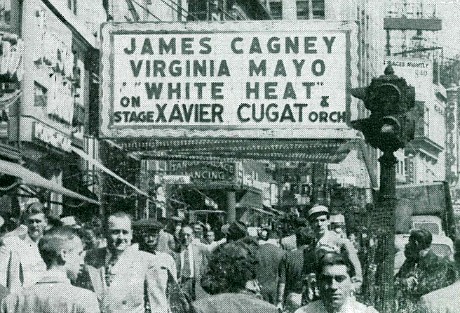
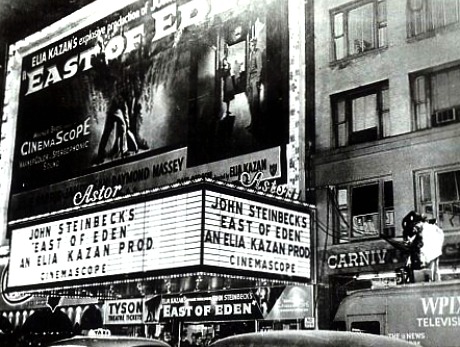
Notice that neither the billboard nor the marquee mentions James Dean — the movie was sold entirely on the reputations of Elia Kazan and John Steinbeck.
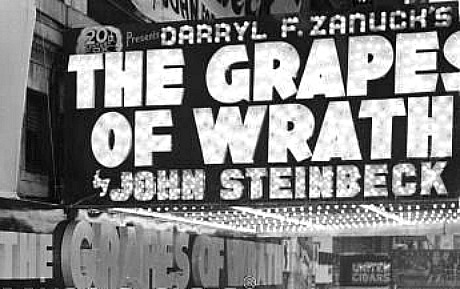
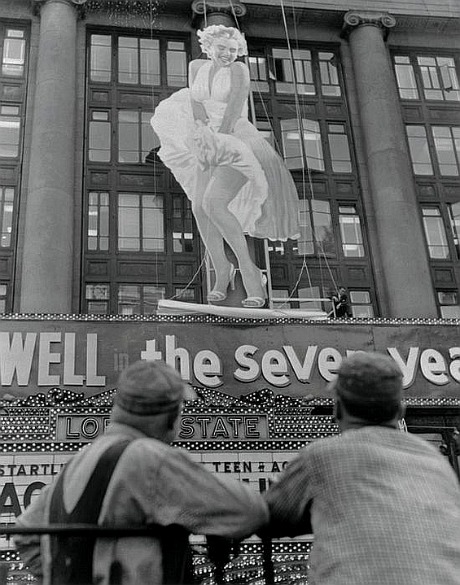
Snapped sometime prior to the 6.3.55 opening date of The Seven Year Itch, the second of five ’50s films directed by Billy Wilder during his house-director phase, so-called because these film represented a creative hibernation for Wilder, a retreat from his usual cynical characters and stories, acid-tinged dialogue, third-act emotional turnarounds. The house phase also included Sabrina (’54), The Spirit of St. Louis (’57), Love in the Afternoon (’57) and Witness for the Prosecution (’57). Wilder finally returned to form in ’59 with Some Like It Hot. The house phase began in the wake of the success of Wilder’s Stalag 17 (’53). It’s been speculated it may have partly been prompted by the failure of Wilder’s bitterly caustic Ace in the Hole (’51).

